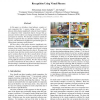Free Online Productivity Tools
i2Speak
i2Symbol
i2OCR
iTex2Img
iWeb2Print
iWeb2Shot
i2Type
iPdf2Split
iPdf2Merge
i2Bopomofo
i2Arabic
i2Style
i2Image
i2PDF
iLatex2Rtf
Sci2ools
148
click to vote
CVPR
2011
IEEE
2011
IEEE
Recognition Using Visual Phrases
In this paper we introduce visual phrases, complex visual composites like “a person riding a horse”. Visual phrases often display significantly reduced visual complexity compared to their component objects, because the appearance of those objects can change profoundly when they participate in relations. We introduce a dataset suitable for phrasal recognition that uses familiar PASCAL object categories, and demonstrate significant experimental gains resulting from exploiting visual phrases. We show that a visual phrase detector significantly outperforms a baseline which detects component objects and reasons about relations, even though visual phrase training sets tend to be smaller than those for objects. We argue that any multi-class detection system must decode detector outputs to produce final results; this is usually done with nonmaximum suppression. We describe a novel decoding procedure that can account accurately for local context without solving difficult inference pro...
Related Content
| Added | 30 Apr 2011 |
| Updated | 30 Apr 2011 |
| Type | Journal |
| Year | 2011 |
| Where | CVPR |
| Authors | Ali Farhadi, Mohammad Amin Sadeghi |
Comments (0)

